- City striker Alvaro Negredo had a late effort saved by Bayern goalkeeper Manuel Neuer - which prevented the Premier League side from finishing top and then possibly playing the likes of Olympiakos or Bayer Leverkusen. But it did not take any of the gloss off of a brilliant win against a Bayern Munich side which had not previously lost this season.

-
Hello and welcome to Wednesday's Sportsday! Before we wrap our minds around another action-packed day of sport, let's start with Manchester City's superb 3-2 win over European champions Bayern Munich.
The Blues battled back from a 2-0 deficit to shock the Germans on their own patch. However, City boss Pellegrini seemed not to realise his team were only one goal away from claiming top spot in Champions League Group D - therefore potentially avoiding the likes of Barcelona, Real Madrid and Paris St-Germain in the last 16.
Galatasaray's vital Group B game against Juventus will resume at 13:00 GMT today after being abandoned because of snow.
The sides were taken off after 32 minutes of play - with the game goalless - because the lines on the pitch were not visible following heavy snowfall in Istanbul.
Italian champions Juventus need a point to claim to qualify as group runners-up, while their Turkish opponents require a victory to progress.
 After years of disagreement and distrust, a deal between Iran and
international powers over its nuclear program seems near as top
diplomats flock to the site of ongoing talks.
After years of disagreement and distrust, a deal between Iran and
international powers over its nuclear program seems near as top
diplomats flock to the site of ongoing talks.
U.S. Secretary of State John Kerry landed in Geneva early Saturday and went straight to the venue where talks are being held.
A day before, a Western official said that a deal was within grasp.
And at the beginning of
Saturday's working meeting, the mood was still positive, a leading
European Union diplomat told CNN on condition of anonymity.
The Iranians seem to
share the sentiment. "Not bad," was the assessment of progress by an
Iranian diplomat, who did not wish to be named.
The EU's foreign policy
chief, Catherine Ashton continues to lead the talks with Iranian Foreign
Minister Javad Zarif and his counterparts from other countries, the EU
diplomat said.
She has briefed Kerry,
who went on to meet with world's most powerful foreign policy chiefs.
They have hastily made their way to Geneva, raising hopes that
negotiators working on their behalf are close to an agreement with Iran.
Zarif said Friday there is wide agreement except for a couple of points, the semiofficial Iranian Students News Agency reported.
"Numerically speaking,
perhaps 90% of progress has been made, but there (are) one or two issues
which are of great significance," he said.
Kerry joins British
Foreign Secretary William Hague, and French Foreign Minister Laurent
Fabius. Chinese Foreign Minister Wang Yi will also attend, as well as
his Russian counterpart, Sergey Lavrov.
Together, these
diplomats represent the five permanent members of the U.N. Security
Council plus Germany -- together known as the P5+1 -- which has been
negotiating with Iran on its nuclear program.
Western powers want Iran
to restrain technical advancements that could put it close to
developing a nuclear weapon. Tehran wants economic sanctions that are
strangling its economy loosened.
But Iran also insists it
has the right to enrich uranium, saying that it will only be used for a
peaceful nuclear energy program.
Tehran wants that
written into the deal, which would likely cover a period of six months
and ideally be a precursor to a more sweeping pact, diplomats said.
Western powers, on the
other hand, prefer ambiguity on this matter. They don't want it written
into the agreement. But if Iran states it has the right to enrich
uranium, the West won't argue with it, the diplomats said.
Washington and its allies also only want to lift only some of the sanctions and leave some tough ones in place for now.
For years, Iran and Western powers have left negotiating tables in disagreement, frustration and at times open animosity.
But the diplomatic tone
changed with the transfer of power after Iran's election this year,
which saw President Hassan Rouhani replace Mahmoud Ahmadinejad.
Caustic jabs at the United States and bellicose threats toward Israel were a hallmark of Ahmadinejad's foreign policy rhetoric.
He lambasted the West
over the economic sanctions crippling Iran's economy and at the same
time, pushed the advancement of nuclear technology in Iran.
Rouhani has struck up a more conciliatory tone and made the lifting sanctions against his country a priority.
During a visit to the
U.N. General Assembly in September, Rouhani's moderate approach raised
hopes in the West of a thaw in relations with Tehran and progress in
negotiations on its nuclear program.
Despite the sanctions,
Iran today has 19,000 centrifuges and is building more advanced ones,
according to Mark Hibbs, a nuclear policy expert at the Carnegie
Endowment for International Peace.
Most world powers believe that Iran could not realistically build a usable bomb in less than a year, Hibbs said.
And Iran recently signed
a deal with the International Atomic Energy Agency that agrees to give
the U.N. nuclear watchdog agency access to long-unseen nuclear sites,
including a heavy-water reactor in Arak.
Tehran is also a party to the Treaty on the Non-Proliferation of Nuclear Weapons, which requires it not to create nuclear weapons or enable other countries to obtain them.
Key U.S. allies in the Middle East and some Washington lawmakers still don't trust Iran.
They believe that by
making concessions on sanctions, the United States and its allies are
giving up important leverage against Tehran.
Saudi Arabia, Iran's
nearby neighbor across the Persian Gulf, has lasting tensions with
Tehran and has publicly derided the Obama administration's negotiating
stance.
A bipartisan group of
six senators urged the President's team to reject the proposed deal and
accept only an agreement that better dismantles Iran's nuclear
technology.
Israeli leaders, as
well, would like to see the heat turned up on Tehran, not down. Defense
Minister Moshe Ya'alon reiterated the point after a meeting with U.S.
Secretary of Defense Chuck Hagel on Saturday in Israel.
"We think the deal that
is on the table is a bad one and even if this deal is signed there will
be a lot to do afterward to bring the Iranian regime face to face with
the dilemma of the bomb or survival."
Israel has said that it reserves the right to defend itself militarily against an Iranian nuclear threat.
Israeli Prime Minister
Benjamin Netanyahu has been adamant in his distrust of Tehran and his
belief that sanctions are working and should get tougher.
"If you give it up now,
when you have that pressure, and Iran doesn't even take apart, dismantle
one centrifuge, what leverage will you have when you've eased the
pressure?"
But President Barack
Obama said that sanctions put in place during his administration had
forced Iran to the negotiating table and easing them some could help
move things forward.
The proposed deal would
only "open up the spigot a little bit" on frozen revenue, while leaving
in place the bulk of the most effective sanctions involving Iranian oil
exports and banking.
The President also
stressed that all options, including military strikes on Iran's nuclear
facilities, remained on the table as far as the United States was
concerned.
 More than 400,000 people
in India have been evacuated as a massive cyclone sweeps through the Bay
of Bengal towards the east coast.
More than 400,000 people
in India have been evacuated as a massive cyclone sweeps through the Bay
of Bengal towards the east coast. The Meteorological Department has predicted the storm will bring winds up to 220 km/h (136mph).
A deadly super-cyclone in 1999 killed more than 10,000 people in Orissa.
But officials say this time they are better prepared, the BBC's Sanjoy Majumder in Delhi reports.
However, the US Navy's Joint Typhoon Warning Center in Hawaii is forecasting even stronger winds, predicting sustained speeds of up to 269 km/h (167 mph).
The Egyptian government's state of emergency should be lifted and a
process of reconciliation must begin, President Barack Obama said
Thursday of the turmoil in that country.
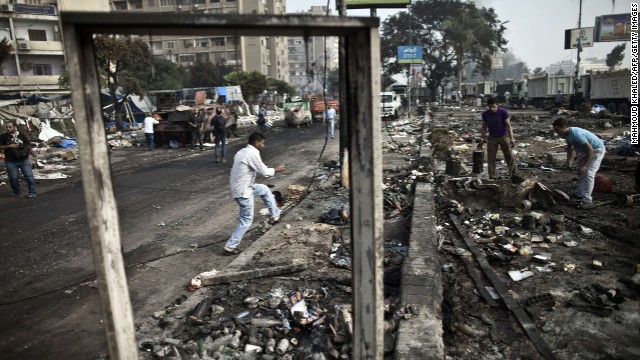 The president also
condemned the violence against civilians and announced the United States
is canceling next month's joint U.S.-Egyptian military exercises.
The president also
condemned the violence against civilians and announced the United States
is canceling next month's joint U.S.-Egyptian military exercises.
 The president also
condemned the violence against civilians and announced the United States
is canceling next month's joint U.S.-Egyptian military exercises.
The president also
condemned the violence against civilians and announced the United States
is canceling next month's joint U.S.-Egyptian military exercises.
When Egypt's first
democratically elected president was tossed out earlier this year, the
White House stopped short of calling it a coup.
Doing so would have
forced an end to the $1.3 billion that the U.S. sends in military aid
every year -- and changed the course of its relationship with its
strongest Arab ally in the region.
But that was before Wednesday, when the military-led interim government stormed two camps
full of former President Mohamed Morsy's supporters. More than 525
people were killed and 3,717 wounded in the bloodiest day in Egypt's
recent history, officials there said.
Will the carnage in Egypt change the U.S. policy toward the most populous Arab country?
 Hundreds of Muslim Brotherhood supporters have set fire to a government building in Giza, near the Egyptian capital, Cairo.
Hundreds of Muslim Brotherhood supporters have set fire to a government building in Giza, near the Egyptian capital, Cairo.Brotherhood members had been protesting for weeks about the army's overthrow of President Mohammed Morsi in July.
The government says 525 died nationwide on Wednesday, but the final toll is likely to be significantly higher.
Scores of bodies have not been registered, because the official count only includes bodies which have passed through hospitals.
The BBC's Khaled Ezzelarab has reported seeing at least 140 bodies wrapped in shrouds at the Eman mosque, close to the main protest camp at Rabaa al-Adawiya Square. These will not have been counted in the official toll.
The Muslim Brotherhood insists that more than 2,000 people died. It says 300 bodies were taken to the Eman mosque, and other bodies were taken to sports halls.
Reports speak of disputes between bereaved relatives and officials entrusted with documenting the causes of death.
The Muslim Brotherhood, the main source of Mr Morsi's
support, had called for marches on Thursday, both in Cairo and Egypt's
second city, Alexandria, to protest against Wednesday's deaths. After attempting to storm the building housing the local government in Giza - Cairo's twin city on the west bank of the Nile - the protesters were repelled by police, according to state television.
Local TV footage showed two buildings burning, and firefighters evacuating employees.
State-run Nile News TV also reported clashes between Muslim Brotherhood members and residents in a suburb of Alexandria.
'Serious massacre' Armoured bulldozers had moved into the two protest camps in Cairo shortly after dawn on Wednesday morning.
The smaller of the two protest camps, at Nahda Square, was cleared quickly but clashes raged for several hours in and around the main encampment at Rabaa al-Adawiya. The mosque of the same name was damaged by fire.
Mobs later carried out reprisal attacks on government buildings and police stations as well as churches belonging to the country's Coptic Christian minority.
In a televised address on Wednesday evening, Egyptian interim Prime Minister Hazem Beblawi defended the operation, saying the authorities had to restore security.
He declared a state of emergency, but said this would be lifted as soon as possible.
Many countries have condemned the Egyptian security forces' actions.
Navi Pillay, the UN High Commissioner for Human Rights, has demanded an independent, impartial inquiry into what happened on Wednesday.
"The number of people killed or injured, even according to the government's figures, point to an excessive, even extreme, use of force against demonstrators," Ms Pillay said in a statement.
Turkish Prime Minister Recep Tayyip Erdogan described the events as a "very serious massacre".
US President Barack Obama is due to give a statement on the issue soon.
Mr Morsi, Egypt's first democratically elected president, was ousted by the military on 3 July.
He is now in custody, charged with murder over a 2011 jailbreak. His period of detention was extended by 30 days on Thursday, state media said.
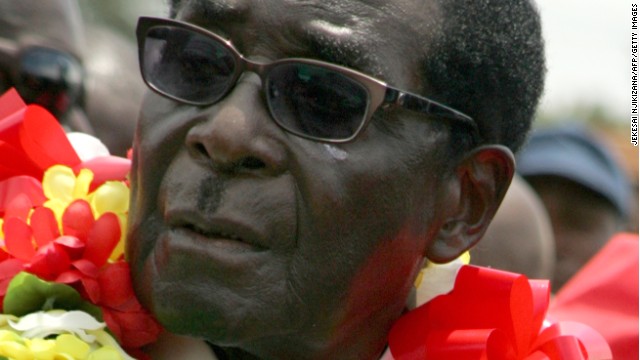 Zimbabwe has known only one leader in its entire 33-year history as an independent nation, and President Robert Mugabe hopes that doesn't change any time soon.
Zimbabwe has known only one leader in its entire 33-year history as an independent nation, and President Robert Mugabe hopes that doesn't change any time soon.
Voters head to the polls
Wednesday for the first time since the violence-marred election in 2008
to choose between the 89-year-old incumbent and his arch political
rival-turned-prime minister, Morgan Tsvangirai.Zimbabwe has known only one leader in its entire 33-year history as an independent nation, and President Robert Mugabe hopes that doesn't change any time soon.
Voters head to the polls
Wednesday for the first time since the violence-marred election in 2008
to choose between the 89-year-old incumbent and his arch political
rival-turned-prime minister, Morgan Tsvangirai.As the July 31 vote day approaches, Zimbabwean election officials and
some human rights organizations are giving sharply different assessments on the likely validity of the vote.
Once again, there are
allegations that Mugabe's government is targeting the opposition through
military intimidation and arrests, and that it is padding the voter
list.
But the deputy chairwoman
of Zimbabwe's Electoral Commission insists that the country is ready
for the elections, and vowed the outcome will be valid.
"Elections will be credible, free and fair," Joyce Kazembe told the South African Press Association this week.
Some 600 foreign
observers are monitoring the ballot, in addition to 6,000 local
monitors, according to SAPA. Zimbabwe did not invite Western observers
to monitor the elections because of sanctions imposed on Mugabe and his
top officials for rights abuses.
The African Union, which has sent more than 60 members to monitor the elections, has also expressed confidence in the process.
"The environment in
Zimbabwe so far reassures us that that the conditions are good for the
election to be held on July 31," Aisha Abdullahi, AU commissioner for
political affairs, said at a news conference last week, according to
SAPA.
Some observers say that the country may not be as ready as the African Union and Zimbabwe officials suggest.
A Human Rights Watch investigation
last month found that the Zimbabwe national army "has deployed soldiers
across the country, intimidating, beating, and otherwise abusing
perceived supporters of the Movement for Democratic Change or those
critical of the government."
Zimbabwe's government
has also arrested lawyers and members of organizations they see as
threatening, according to Beatrice Mtetwa, a human rights lawyer based
in Zimbabwe.
"Certainly in the last nine months we've seen a lot of civil society activists being arrested," Mtetwa told CNN's Christiane Amanpour last month.
"I also believe that my arrest is part of that crackdown because they
want as few human rights lawyers to be out there during the election
period as they can manage to stop," she added.
Mtetwa was detained in
March after she asked police for a search warrant when they searched one
of her clients' homes, Amnesty International documented. When she told
the police that what they were doing was "unlawful, unconstitutional,
illegal and undemocratic," she was arrested for "obstructing the course
of justice."
There are also concerns that the voter roll may be inaccurate.
More than 1 million
people on the roll were found to be either deceased or departed, while
63 constituencies had more registered voters than inhabitants, according
to a report last month by Research and Advocacy Unit, a Harare-based non-governmental research organization.
"Such statistics suggest
that the gap between the ideal and the actual impinges upon the
integrity of Zimbabwe's electoral process," the report stated.
Opposition party leaders
and observers have called for postponement of elections, saying that
more time is required to establish a transparent voting process.
Early voting for
security services members has already seen problems due to shortages of
ballot papers and voting ink. Out of 63,268 people who were eligible to
vote in the early polling, only 37,108 voted, according to Kazembe.
Tsvangirai and the Southern Africa Development Community have urged Mugabe to delay the ballot.
There are fears that
this election could descend into violence like the last election in
2008, which resulted in a runoff. Tsvangirai pulled out of the runoff,
citing intimidation, torture, mutilation and murder of his supporters.
Regional leaders
dismissed Zimbabwe's 2008 election as a sham, and the SADC pressured
Mugabe to form a power-sharing agreement with Tsvangirai and his
opposition Movement for Democratic Change. As a result, the two bitter
rivals entered into an uneasy governing coalition in 2009.
Some 6.4 million voters
in Zimbabwe -- about half of the country's population -- will be
eligible to cast their ballots on Wednesday, according to the Zimbabwe
Electoral Commission.
The elections will be
held under a new constitution endorsed in a referendum in March that
limits the president to two five-year terms. Mugabe is allowed to seek
another term because the new charter does not apply retroactively.
Last week, Mugabe had a few words for critics of the upcoming election.
In response to
criticisms from the United States on his push for elections without key
reforms, Mugabe said at a rally, "Keep your pink nose out of our
affairs, please."
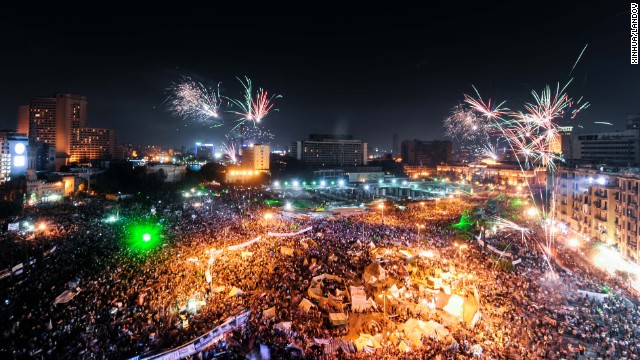 The Egyptian military opened fire on supporters of the deposed president, Mohamed Morsy, and the Muslim Brotherhood, early Monday, killing more than 40 people.
The Egyptian military opened fire on supporters of the deposed president, Mohamed Morsy, and the Muslim Brotherhood, early Monday, killing more than 40 people.
The health ministry put the number of fatalities at 42, and said 322 others were wounded.
CNN counted at least
eight bullet-riddled bodies and up to 40 wounded at the chaotic
emergency facility in the Egyptian capital, down the street from the
site of the shooting. The upper bodies of the victims appeared to be
peppered with shotgun pellets and bullet wounds.
Doctors tended to the
victims, performing surgeries in many cases before shipping them out to
other facilities. Egyptian flags were draped over those who did not
survive.
The crowd had been
holding vigil outside Republican Guards headquarters, where Morsy was
reportedly detained after his arrest Wednesday.
Around the time of morning prayers, witnesses said the military and police opened fire with machine guns and tear gas.
The Egyptian military had a different version of events.
The army said an armed
terrorist group attempted to raid the facility and attacked security
forces, killing one officer, according to the state news agency MENA.
The army arrested 200 attackers, who were carrying guns, ammunition, and Molotov cocktails, MENA reported.
Party withdraws from talks
Reacting to the
shooting, the Al-Nour party -- which supported Morsy's ouster --
withdrew from all talks about forming an interim government.
"We will not remain silent on the Republican Guards Massacre," party spokesman Nader Bakkar said.
Stepping up security
The developments came as protesters took to the streets again, where, for weeks, arguments have turned to clashes.
Ahead of Monday's events, more than 30 people had died and 1,400 had suffered injuries since Wednesday's coup.
Egypt's military said in a statement over the weekend that it was stepping up security efforts for the demonstrations.
"We also warn against
any provocation or clashes with the peaceful demonstrators," the
statement said. "Anyone who violates these instructions will be dealt
with firmly in accordance with the law."
Supporters vow peaceful protests
Meanwhile, the Muslim
Brotherhood's political party vowed that protests would be peaceful and
accused authorities of planning to send fake bearded men into Cairo's
Tahrir Square to incite violence.
"This is so they can
claim that the supporters of the elected-president and the Islamic
groups are attacking the peaceful demonstrators. ... We warn those who
play with fire that any sectarian incitement at this critical time will
not be in the interests of anyone in our beloved Egypt," the Freedom and
Justice Party said in a statement posted on its Facebook page.
Human Rights Watch called for the country's military and political leaders to do more to stop the bloodshed.
"All sides need to tell
their followers to refrain from actions likely to lead to violence and
loss of life," Joe Stork, deputy Middle East and North Africa director
at Human Rights Watch, said in a statement. "At the same time, the
security forces need to show that they can act professionally and
effectively to stop the violence without resorting to unlawful lethal
force."
Politics in the midst of chaos
The latest violence
comes only hours after state television reported that Egypt's interim
president has nominated Mohamed ElBaradei to serve as vice president and
Ziad Bahaa el Din as prime minister.
Interim President Adly Mansour will need to get political consensus before they are appointed.
Presidential spokesman
Ahmed Almoslemani stressed on state-run Nile TV there is no specific
deadline of when the new government will be announced.
Nile TV had previously reported that he said an announcement would be made within 24 hours.
Earlier, ElBaradei's
name had been floated for the office of prime minister, but a
swearing-in announced for Saturday didn't happen.
Activist group Tamarod
spokesman Mahmoud Badr told Egypt's OTV on Sunday that the presidency
had tapped ElBaradei to form the new government but then retracted the
offer after objections from the conservative al-Nour party.
ElBaradei is known
around the world as the former head of the U.N. atomic watchdog agency,
the International Atomic Energy Agency.
He was to appear Sunday
in an interview with CNN's Fareed Zakaria but canceled it along with all
other media interviews, his office said.
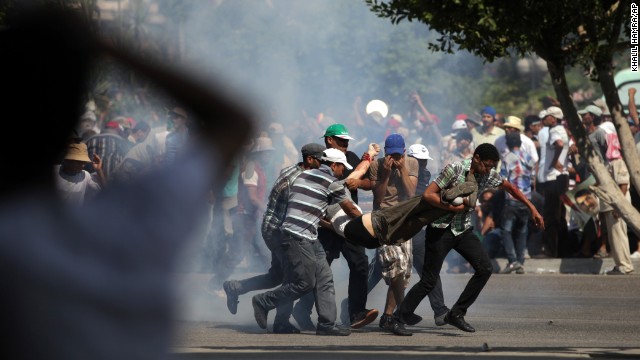 Violence erupts in Sinai
Violence erupts in Sinai
In the lawless desert of
the Sinai, where al Qaeda affiliates have long had a foothold, violent
attacks erupted after Morsy's removal.
On Sunday, armed men
blew up a pipeline transporting natural gas to Jordan, an ally of Israel
and the United States, said a senior Egyptian intelligence officer, who
asked not to be named.
Such attacks had ceased when Morsy was president. Before that, armed groups destroyed pipelines every few months, he said.
State-run EgyNews
reported Sunday that three police officers in northern Sinai were shot
and wounded while on duty when someone in an unmarked car fired shots at
them and sped away.
It is unclear whether the attacks were a reaction to events in Cairo.
The pilot of the Asiana Airlines flight that crashed in San
Francisco over the weekend had no experience landing a Boeing 777 at
that airport. And one of the two teens who died after the crash may have
been run over by a first responder's vehicle.
The revelations are the
latest in a flurry of developments from the crash at San Francisco
International Airport that killed two 16 year-old girls from China and
sent 182 people to the hospital Saturday.
The flight, with 307
people on board, originated in Shanghai, China, and stopped in Seoul,
South Korea. It was preparing to land in San Francisco when the rear of
the plane struck the edge of the runway, severing the tail and causing
the plane to erupt in smoke and flames.
Questions surround tragedy
The San Francisco Fire
Department said one of the girls killed may have been struck by an
emergency vehicle, San Mateo County Coroner Robert Foucrault said.
"Part of our examination
is to determine the cause of death. Our examination will determine
whether it was from the airplane crash or secondary incident," Foucrault
said.
Ye Mengyuan and Wang
Linjia were among 35 Chinese students headed to California to attend
West Valley Christian School's summer church camp, the school said on its website.
The two girls had signed up for the $5,000 summer program aimed to improve students' English.
The National
Transportation Safety Board is also looking into reports that one of the
girls may have been run over by an emergency vehicle.
"We are aware of the
reports but don't have any details yet," NTSB spokeswoman Kelly Nantel
said. "Our investigators will be looking very closely at this issue ...
We are looking to determine if there are lessons to be learned from this
accident."
The San Francisco Fire Department has not responded to CNN's request for comment.
Pilot's flight record
The pilot who was
landing Asiana Airlines Flight 214 was making his first descent with a
Boeing 777 at the San Francisco airport, the airline said.
But it wasn't his first time flying to San Francisco nor his first time in control of a 777.
Lee Kang-kuk, the pilot
who was in the captain's seat, had flown from Seoul to San Francisco
several times between 1999 and 2004, the airline said.
Including the flight
Saturday, Lee flew a Boeing 777 nine times, clocking a total of 43 hours
on that model of aircraft, Asiana said. He has piloted a total of about
10,000 hours, the airline said.
Lee was one of four pilots on board who were working in shifts Saturday.
South Korean and U.S.
investigators will jointly question Lee on Monday, said Choi Jeong-ho,
the head of South Korean's Aviation Policy Bureau.
They will also question Lee Jeong-min, who was sitting in the co-pilot's seat, Choi said.
Clues from the voice recorder
The cockpit voice and
flight data recorders showed the flight was coming in too slow and too
low and that the pilots apparently sped up seven seconds before impact,
the National Transportation Safety Board said Sunday.
Four seconds before
impact, a stall warning sounded -- warning the pilots the plane was
about to lose its ability to stay in the air.
The voice recorder
apparently showed the pilots tried to abort the landing less than two
seconds before the plane crashed, NTSB head Deborah Hersman said.
The crew then made an internal decision "to initiate a go-around 1.5 seconds to impact," she said.
When asked if pilot error was to blame, Hersman said the crash landing was still under investigation.
"I would discourage anyone from drawing any conclusions at this point," she said.
The NTSB has ruled out weather as a problem and said that conditions were right for a "visual landing."
Officials are investigating whether construction at the airport may have played a role.
Construction to extend a
runway safety area temporarily shut off the so-called glide slope
system, which is one of several options pilots have to help them land
planes safely, Hersman said.
The frightening crash
With no warning from the
cockpit, survivors said, the plane slammed onto the edge of the runway
near the seawall. The impact severed the plane's tail and sent the rest
of the body spinning on its belly.
When rescuers arrived, they found some passengers coming out of the water, said city fire chief Joanne Hayes-White.
"There was a fire on the
plane, so the assumption might be that they went near the water's edge,
which is very shallow, to maybe douse themselves with water," she said.
Amateur video obtained exclusively by CNN shows
the plane crashing and spinning counterclockwise and coming to a stop.
Fred Hayes said he shot the video about a mile from the crash scene.
In all, 182 people were hospitalized. Their injuries ranged from severe road rash to paralysis.
'We're lucky'
The crash, followed by flames and clouds of smoke spewing from the gaping roof, left many fearing the worst.
But 123 of the 307 people on board walked away uninjured.
"We're lucky there hasn't been a greater loss of life," the fire chief said.
Medical personnel were also expecting more casualties.
"We were expecting a lot
of burns, but we didn't see them," said Dr. Margaret Knudson, San
Francisco General Hospital's chief of surgery. Six survivors were in
critical condition at the hospital Sunday.
Many of the injured said
they were sitting toward the rear of the aircraft, said Knudson.
Several suffered abdominal injuries and spine fractures, some of which
include paralysis and head trauma, she said.
Passenger Benjamin Levy said he was bracing for more trauma but ended up walking away from the wreck.
"Honestly, I was waiting
for the plane to ... start flipping upside down, in which case I think a
lot of people would have not made it," Levy said.
"If we flipped, none of us would be here to talk about it.
Sebastien De La Cruz, 11, performed the National Anthem
at Game 3 of the NBA Finals in San Antonio on Tuesday night, filling in
for country crooner Darius Rucker, who had to cancel at the last
minute.
By all accounts, Sebastien, a former "America's Got Talent"
performer, brought the house down with his rendition of "The
Star-Spangled Banner." Some viewers, however, fired off racist comments
on social networks like Twitter following the performance.The young singer spoke with KENS-5 about the backlash.
"With the racist remarks, it was just people how they were raised. My father and my mama told me you should never judge people by how they look," Sebastien said.
The singer specializes in mariachi-style singing and performed the National Anthem in a black-and-silver suit, inspired by his hometown Spurs.
"When I started mariachi, I knew there was gonna be a lot of politics," Sebastien told KENS-5. "And I'm just a proud American, to be honest."
San Antonio Mayor Julián Castro tweeted his support for Sebastien.
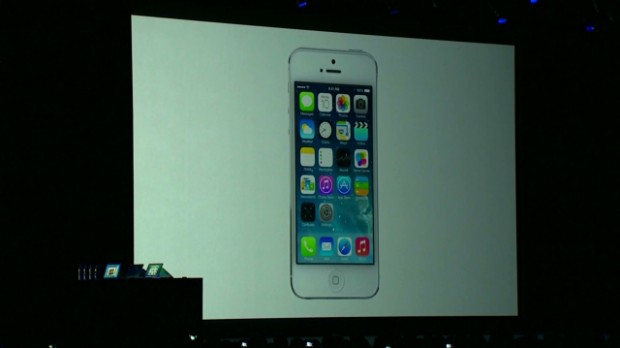 The new update to the iPhone and iPad operating system
is much more than just a fresh veneer. Beyond its flattened user
interface that no longer tries to mimic real-life textures, you'll find
that iOS has been rethought as much as its been redesigned.
The new update to the iPhone and iPad operating system
is much more than just a fresh veneer. Beyond its flattened user
interface that no longer tries to mimic real-life textures, you'll find
that iOS has been rethought as much as its been redesigned. Every core app that Apple (AAPL, Fortune 500) includes with iOS has been given a facelift. In many cases, those apps have been newly conceived. For example, the Photos app now models itself after Facebook's (FB) Instagram, and the music app baked in some crucial, Pandora-esque (P) streaming functionality.
It's true that many of the revamped, improved and new features found in iOS 7 are examples of Apple playing catch up with Google's (GOOG, Fortune 500) Android and Microsoft's (MSFT, Fortune 500) Windows Phone.
New features like Control Center, which lets you quickly tweak settings, appears ripped straight from Google. A new card metaphor for app switching first appeared on the ill-fated Palm Pre in 2009. In iOS 7, every app will have the ability to run in the background and update itself without user interaction, just like Android. And the daily agenda view in Notification Center very much feels like a response to Google Now.
Still, these much-needed, overdue changes address some substantial problems that had been plaguing iOS for years. Just because Apple didn't think up these ideas doesn't mean that iOS isn't better for employing them, and adopting the better parts of its competition only helps to accentuate Apple's undeniable strengths, such as its app ecosystem.
And even if they're less pronounced, Apple still showed off some new innovations in iOS 7.
Apple didn't just go "flat" with its new user interface -- it went one step further than what Android and Windows Phone have been doing. Apple skillfully used layers and translucency to re-introduce a sense of depth to iOS. Some people in the tech community, including Gizmodo's Kelsey Campbell-Dollaghan, have argued "depth" is the next step after the flat UI craze.
A feature like the parallax wallpaper, which orients itself differently depending on how you hold the phone, adds enough of a "gee whiz" factor without getting in the way. It may seem totally superfluous, but those kind of design innovations give some humanity to iOS.
With iOS 7, Apple has positioned itself a half-step ahead of the pack in the design arena. That's a major achievement given how archaic iOS was starting to look.
Consider the fact that, under the leadership of design chief Jony Ive, Apple overhauled the entirety of iOS in less than a year. That process began immediately after CEO Tim Cook kicked Scott Forstall, iOS' former leather-loving boss, to the curb and restructured Apple's leadership.
If iOS 7's performance meets the expectations that its new design has set, it serves as a promising sign that Apple's executive team is capable of keeping the company humming along. Apple may not be light-years ahead of the competition like it once was, but at the very least, iOS again resembles a modern mobile operating system.
Now, Apple can once again focus more on innovating and less about preventing itself from from falling on its face.
 Taksim Square, the focus of days of protest, is now largely cleared.
Taksim Square, the focus of days of protest, is now largely cleared.But protesters have regrouped in nearby Gezi Park, whose proposed redevelopment sparked anger which has widened into nationwide anti-government unrest.
PM Recep Tayyip Erdogan has said there will be no tolerance of people he accuses of seeking to harm Turkey.
The demonstrators accuse Mr Erdogan of becoming increasingly authoritarian and trying to impose conservative Islamic values on a secular state.
Mr Erdogan is due to meet a group of people -
including an actress, a singer and a writer - who he hopes can mediate
with the protesters.
It had been suggested he would hold talks with protest
organisers, but they told the BBC that they had not been approached by
the prime minister - and would refuse to meet him even if they were.They added that they did not recognise any of the group that Mr Erdogan was due to meet as representatives of the protesters in the park.
Throughout Tuesday, riot police had repeatedly clashed with protesters throwing bottles, stones and firebombs. Many peaceful demonstrators were also caught in the clashes.
Thousands converged on the square as night fell and were repelled by water cannon, rubber bullets and tear gas.
Dispersed demonstrators sought shelter nearby, including in Gezi Park. Police said they did not plan to enter the park.
Volunteers set up makeshift clinics to treat anyone injured.
Security forces cleared the square, only for the demonstrators to return.
 Twelve days in Taksim Square
Protests in Taksim Square since 1 June
Twelve days in Taksim Square
Protests in Taksim Square since 1 June
Video released early Monday by New Orleans police shows a possible suspect in the Mother's Day gunfire that wounded 19 people during a neighborhood parade.
The grainy surveillance video shows a crowd suddenly scattering in all directions, with some falling to the ground. They appear to be running from a man who turns and runs out of the picture. The person is wearing a white T-shirt and dark pants. The image isn't clear but police say they hope someone will recognize him and notify investigators.
Still pictures of the suspect have been posted on YouTube, police said.
Police believe more than one gun was fired in the burst of Sunday afternoon violence — the latest to flare up around a celebration this year — and they have vowed to swiftly track down those responsible. Detectives were conducting interviews, collecting any surveillance video they could find and gathering evidence from the scene. Cell phone video taken in the aftermath of the shooting shows victims lying on the ground, blood on the pavement and others bending over to comfort them.
Police also say the reward for information leading to arrests and indictments in the case is $10,000.
At least three of the victims were seriously wounded. Of the rest, many were grazed and authorities said that, overall, most wounds were not life threatening. No deaths were reported.
The victims included 10 men, seven women, a boy and a girl. The children, both 10 years old, were grazed and in good condition.
It's not the first time gunfire has shattered a festive mood in the
city this year. Five people were wounded in January after a Martin
Luther King Jr. Day parade, and four were wounded in a shooting in the
French Quarter in the days leading up to Mardi Gras.The grainy surveillance video shows a crowd suddenly scattering in all directions, with some falling to the ground. They appear to be running from a man who turns and runs out of the picture. The person is wearing a white T-shirt and dark pants. The image isn't clear but police say they hope someone will recognize him and notify investigators.
Still pictures of the suspect have been posted on YouTube, police said.
Police believe more than one gun was fired in the burst of Sunday afternoon violence — the latest to flare up around a celebration this year — and they have vowed to swiftly track down those responsible. Detectives were conducting interviews, collecting any surveillance video they could find and gathering evidence from the scene. Cell phone video taken in the aftermath of the shooting shows victims lying on the ground, blood on the pavement and others bending over to comfort them.
Police also say the reward for information leading to arrests and indictments in the case is $10,000.
At least three of the victims were seriously wounded. Of the rest, many were grazed and authorities said that, overall, most wounds were not life threatening. No deaths were reported.
The victims included 10 men, seven women, a boy and a girl. The children, both 10 years old, were grazed and in good condition.
"The specialness of the day doesn't appear to interrupt the relentless drumbeat of violence," Mayor Mitch Landrieu said at a news conference outside a hospital where victims were being treated Sunday night.
Mary Beth Romig, a spokeswoman for the FBI in New Orleans, said federal investigators have no indication the shooting was an act of terrorism.
"It's strictly an act of street violence in New Orleans," she said.
As many as 400 people came out for the second-line procession — a boisterous New Orleans tradition — though only half that many were in the immediate vicinity of the shooting, Police Superintendent Ronal Serpas said. Officers were interspersed with the marchers, which is routine for such events.
Police saw three suspects running from the scene. No arrests had been made as of late Sunday.
Outside the hospital Sunday night, Leonard Temple became teary as he talked about a friend who was in surgery after being shot three times during the parade. Temple was told the man was hit while trying to push his own daughter out of the way.
"People were just hanging out. We were just chilling. And this happened. Bad things always happen to good people," said Temple, who was at the parade but didn't see the shootings.
Second-line parades are loose processions in which people dance down the street, often following behind a brass band. They can be planned events or impromptu offshoots of other celebrations. They trace their origins to the city's famous jazz funerals.
A social club called The Original Big 7 organized Sunday's event. The group was founded in 1996 at the Saint Bernard housing projects, according to its MySpace page.
The neighborhood where the shooting happened is a mix of low-income and middle-class row houses, some boarded up. As of last year, the 7th Ward's population was about 60 percent of its pre-Hurricane Katrina level.
The crime scene was about 1.5 miles from the heart of the French Quarter and near the Treme neighborhood, which has been the centerpiece for the HBO TV series "Treme."
Sunday's violence comes at a time when the city is struggling to pay for tens of millions of dollars required under federal consent decrees to reform the police department and the city jail.
Shootings at parades and neighborhood celebrations have become more common in recent years as the city has struggled with street crime, sometimes gang-related.
In January, police said a feud resulted in the drive-by shooting that wounded five people about 30 minutes after a parade had passed by on Martin Luther King Jr. Day. The next month, four people were shot following an argument in the French Quarter during the last weekend of partying before Mardi Gras. Arrests were made in both cases.
Police vowed to solve Sunday's shooting, too. Serpas said it wasn't clear if particular people in the second line were targeted, or if the shots were fired at random.
"We'll get them. We have good resources in this neighborhood," Serpas said.
 Annie Idibia nee Macaulay, a Nollywood actress and the wife of millionaire singer 2face Idibia has openly denied her pregnancy weeks after suffering a sad miscarriage.
Annie Idibia nee Macaulay, a Nollywood actress and the wife of millionaire singer 2face Idibia has openly denied her pregnancy weeks after suffering a sad miscarriage.According to sources in the know, the actress who got pregnant way before her traditional wedding ceremony lost the pregnancy due to marriage planning stress and other medical conditions.
As we speak, the actress has lost a 2-month-old pregnancy to miscarriage.
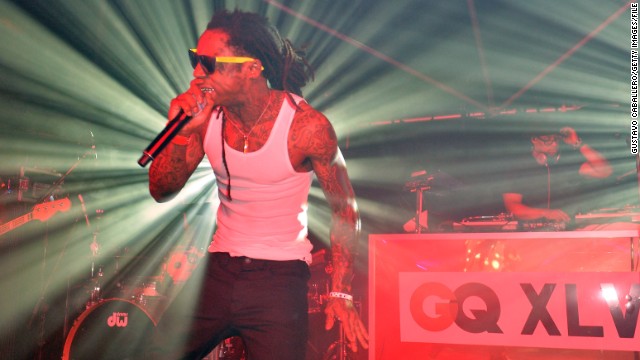 PepsiCo is ending its relationship with rapper Lil Wayne over what
the company calls an "offensive reference to a revered civil rights
icon" -- 14-year-old Emmett Till, who was killed nearly 60 years ago.
PepsiCo is ending its relationship with rapper Lil Wayne over what
the company calls an "offensive reference to a revered civil rights
icon" -- 14-year-old Emmett Till, who was killed nearly 60 years ago.
The rap superstar, featured in the song "Karate Chop" by Future, says: "Beat that p---- up like Emmett Till."
Till, a 14-year-old black
youth, was killed in Mississippi in 1955 for allegedly whistling at a
white woman. He was beaten to the extent that his face was
unrecognizable when his body was discovered. He was identified by a
monogrammed ring belonging to his father.
Mountain Dew, a brand of PepsiCo, said Friday its relationship with the rapper would end.
A Mountain Dew spokesman
told CNN, "We do not plan any additional work with Lil Wayne moving
forward. His offensive reference to a revered civil rights icon does not
reflect the values of our brand."
The spokesman declined to comment on the company's previous relationship with the artist.
Sarah Cunningham,
publicist for Lil Wayne's record label, Young Money, issued the
following statement to CNN: "I can confirm that due to creative
differences, we mutually decided to part ways. It was amicable."
Till, a Chicago teenager
who was visiting relatives in Mississippi in 1955, was arrested at
gunpoint and severely beaten. One of his eyes was gouged before he was
killed by a single gunshot to the head. The teen's body was tied to a
large fan before being dumped into a river.
Members of the Till
family could not be reached for comment Friday by CNN, but the Rev. Al
Sharpton said he has set up a meeting next week between PepsiCo
officials and members of the family.
In a statement to CNN,
Sharpton said that the situation was a "teaching moment for Lil Wayne,
corporate America and the family of Emmett Till ... more than a
condemnation of any one artist, it is an affirmation of Emmett Till and a
call for more sensitivity about what we say and do in our culture."
 It is a familiar part of flying. As you taxi towards the runway, a
crackly voice is heard over the intercom. The pilot’s brief summary of
the route, flight time, and weather conditions are designed to inform
but also to reassure. The familiar refrain tells passengers the plane is
in safe, human hands and they can relax and enjoy the flight.
It is a familiar part of flying. As you taxi towards the runway, a
crackly voice is heard over the intercom. The pilot’s brief summary of
the route, flight time, and weather conditions are designed to inform
but also to reassure. The familiar refrain tells passengers the plane is
in safe, human hands and they can relax and enjoy the flight.But the phrase “this is your captain speaking” may soon become a thing of the past, thanks to a new generation of robotic, passenger aircraft that will take to the skies by themselves.
“We believe that unmanned aircraft are the next big transformation in the aviation industry,” says Doug Davis, director of the unmanned aircraft programme at New Mexico State University.
Of course, the military already know this. Automatic landing systems have been used for years to help pilots drop F-18 aircraft on to the narrow landing strips on top of aircraft carriers. Then there is the rise of drone warfare. These planes are still flown remotely by pilots on the ground, but most have the capability to follow a predefined flight path and even land themselves if they get into serious trouble or the link between the ground is broken. The next generation, such as the US Navy’s X-47B, will be even more advanced, with onboard intelligence that will allow it to adapt its course and fly with only minimal input from a pilot.
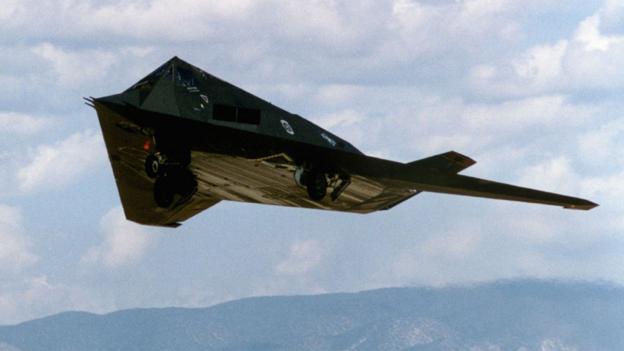 Pilots: Numbered
Pilots: NumberedThe path to this automated future began almost 100 years ago with the introduction of the first autopilot. These systems – designed to keep a plane on a steady, pre-programmed heading and altitude – introduced the first automation into the cockpit, allowing the pilot to step away from the controls.
Over the next century, this trend gathered pace, packing modern aircraft with sophisticated electronics, which often relegate the human to a passive observer. In fact, in some modern aircraft the pilot is only needed to taxi the aircraft to the runway. Everything else from take-off to landing can be automated.
“The technology is here,” says Missy Cummings, an ex military pilot who is now associate professor at the Massachusetts Institute of Technology’s department of Aeronautics and Astronautics.
She points to the rise of so-called fly-by-wire technology, which has replaced the mechanical link between the pilot and the plane’s engines and control surfaces with computer signals sent down a copper wire.
“Any fly-by-wire plane can be an [Unmanned Aerial Vehicle],” she explains. “The controls are digital, not analogue, everything is done electronically so you don’t need a person in there to push a hydraulic actuator.”
To prove the point, technology company BAE Systems recently flew a converted Jetstream aircraft – known as “The Flying Test Bed” – with no pilot in UK air space. The trial flights did have people on board, allowing a human to take control in an emergency. But, for the large part, it flew itself.
But while it is one thing to conduct test flights with pilots on hand in case of an emergency, it is quite another to pack 350 passengers on to plane and send them on their way across the Atlantic with no one at the front. As a result, autonomous flight technology is likely to be adopted in stages.
Already, we are in an era when planes are flown by just two pilots, down for a peak of around five a few decades ago. In the near future increasing automation will mean that number drops to one. And then the next stage could see planes piloted from the ground, like military and scientific craft.
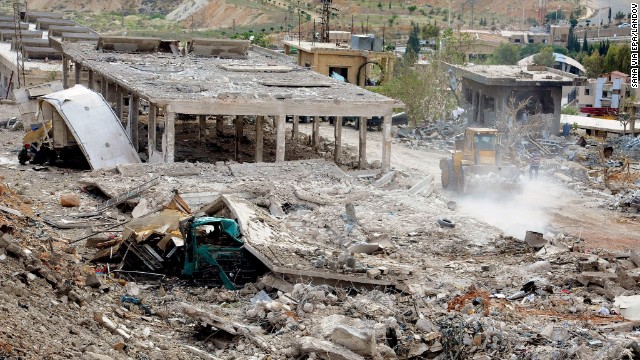 Concern over the possibility of broader war in the Middle East grew
Monday in the wake of reported airstrikes on Syrian military
installations.
Concern over the possibility of broader war in the Middle East grew
Monday in the wake of reported airstrikes on Syrian military
installations.
The reported strikes
killed 42 Syrian soldiers, the opposition Syrian Observatory for Human
Rights said Monday, citing medical sources. It said 100 people remained
missing.
The Syrian government
warned Sunday's apparent strikes -- which followed one last week
attributed by Syria to Israel -- "opens the door wide for all the
possibilities."
Syrian ally Iran warned of a "crushing response" while Russia called reports of Israeli involvement "very worrying."
But an Israeli general
who commands forces on the Syrian border said "there are no winds of
war," according to the Israel Defense Forces website.
The heightened tensions
come amid questions over possible chemical weapon use in Syria and
international debate over how to respond to the country's bloody civil
war, in which more than 70,000 people have died in more than two years
of fighting.
On Monday, a U.N. official spoke of strong suspicions that rebels, not Syrian government forces, have used chemical weapons.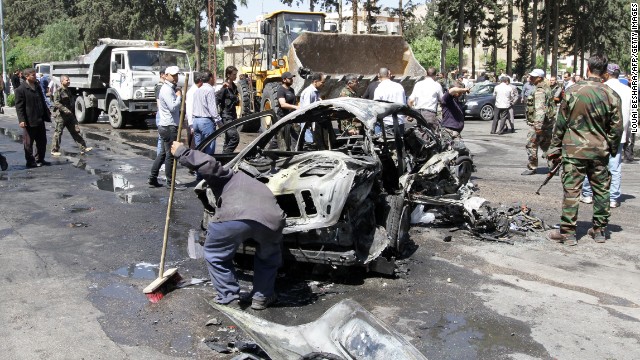

Details of reported strikes
Syria claimed Israeli missiles struck at its military facilities on Sunday.
According to the
state-run SANA news agency, Israeli missiles struck a research center in
Jamayra, a facility in Maysaloun and what the news agency described as a
"paragliding airport" near Damascus.
The blasts prompted terrified residents nearby to run for cover.
"Everything kept
exploding over and over again," said Anna Deeb, whose family lives just
over a mile away. "We could hear gunshots, we could hear people
screaming. ... We didn't know what to do, and there was a problem with
us breathing because the smoke was too much."
Syria says the attack followed another Israeli airstrike late last week.
Israel has not confirmed
or denied that its forces were involved in any attacks inside Syria,
but a U.S. official told CNN's Barbara Starr on Monday that Israeli
forces conducted Sunday's strike, as well as one last week.
Sunday's strike targeted
a research facility in a mountainous area near Damascus and weapons
that were to be transferred to Hezbollah, according to the source.
The earlier strike,
which U.S. officials had previously said happened Thursday or Friday,
targeted Fateh 110 missiles stored at the Damascus airport, the source
said.
Syrian Deputy Foreign Minister Faisal al-Mekdad told CNN the attacks amount to a declaration of war by Israel.
"The details are not
clear on what happened," al-Mekdad told CNN. "Did they fire missiles?
... It is not clear for me, because I don't know how it happened, and of
course it is worrying, but Israel will suffer the same."
Popping and locking are the kinds of things you expect from the set of a Jennifer Lopez music video. Not gunshots.
 J.Lo and Pitbull were filming a clip for "Live It Up" at the Fort
Lauderdale Beach Park Sunday night when the shots were heard nearby. The
Fort Lauderdale Sun-Sentinel reports
that the singer was secured in her car immediately as Fort Lauderdale
police were called to investigate the incident in a parking long just
north of the set.
J.Lo and Pitbull were filming a clip for "Live It Up" at the Fort
Lauderdale Beach Park Sunday night when the shots were heard nearby. The
Fort Lauderdale Sun-Sentinel reports
that the singer was secured in her car immediately as Fort Lauderdale
police were called to investigate the incident in a parking long just
north of the set.
According to the newspaper, no evidence of a shooting was found, and there were no witnesses or injuries.
"Entertainment Tonight" host Rob Marciano happened to have been on set conducting an interview with the 43-year-old star when the incident occurred.
"BREAKING: Gunshots fired on Fort Lauderdale Beach DURING my JLo interview. No kidding. Security scrambled her away," he tweeted, adding a few minutes later, "Can hear and see ambulances converging ~400 yards down the street."
Apparently, things on the video shoot went back to normal rather quickly, as Lopez's boyfriend and choreographer Casper Smart tweeted thanks to his girl, his dancers, and other crew members early Monday morning.
Omg! has reached out to J.Lo's reps for comment.
 J.Lo and Pitbull were filming a clip for "Live It Up" at the Fort
Lauderdale Beach Park Sunday night when the shots were heard nearby. The
Fort Lauderdale Sun-Sentinel reports
that the singer was secured in her car immediately as Fort Lauderdale
police were called to investigate the incident in a parking long just
north of the set.
J.Lo and Pitbull were filming a clip for "Live It Up" at the Fort
Lauderdale Beach Park Sunday night when the shots were heard nearby. The
Fort Lauderdale Sun-Sentinel reports
that the singer was secured in her car immediately as Fort Lauderdale
police were called to investigate the incident in a parking long just
north of the set.According to the newspaper, no evidence of a shooting was found, and there were no witnesses or injuries.
"Entertainment Tonight" host Rob Marciano happened to have been on set conducting an interview with the 43-year-old star when the incident occurred.
"BREAKING: Gunshots fired on Fort Lauderdale Beach DURING my JLo interview. No kidding. Security scrambled her away," he tweeted, adding a few minutes later, "Can hear and see ambulances converging ~400 yards down the street."
Apparently, things on the video shoot went back to normal rather quickly, as Lopez's boyfriend and choreographer Casper Smart tweeted thanks to his girl, his dancers, and other crew members early Monday morning.
Omg! has reached out to J.Lo's reps for comment.
 Shocker! Once again, Chris Brown and Rihanna have parted ways, romantically speaking -- so said Brown during a recent interview with Australian radio show The Kyle and Jackie Show.
Shocker! Once again, Chris Brown and Rihanna have parted ways, romantically speaking -- so said Brown during a recent interview with Australian radio show The Kyle and Jackie Show."Imma do it solo," he said, citing his erstwhile girlfriend's touring schedule, compounded by his own full slate. "I mean, at the end of the day, shawty doing her own thang, she on the road. It's always gonna be love. I'm a grown man, just gotta fast forward."
The love's certainly not gone, he reiterated, but personal and professional commitments make the relationship too difficult right now, he said. "I'm always gonna love that person. I cant be focused on wife-ing someone that young. I need to be the best Chris Brown I can be," he explained.Indeed, Brown reunited with his other on-and-off love, Karrueche Tran, during his birthday bash in Hollywood last Friday -- but, alas, according to an onlooker, "He didn't appear to be paying much attention to her and was partying around a lot of girls."
Adds a source close to Rihanna of the latest split: "Of course tomorrow they could be all over each other again, but for now she's done and just living her life and touring. It's how it always is."
This article originally appeared on Usmagazine.com
He could be sentenced to death if convicted on either count.
At the hearing, he managed to speak once despite a gunshot wound to his throat sustained during his capture.
Mr Tsarnaev, 19, said the word "no" when asked if he could afford a lawyer. Otherwise he nodded in response to Judge Marianne B Bowler's questions from his bed at Boston's Beth Israel Deaconess Medical Center.The next hearing in his case has been scheduled for the end of May.
Meanwhile security officials are expected to
face questioning in the Senate Intelligence Committee about whether the
FBI mishandled information on Mr Tsarnaev's 26-year-old brother
Tamerlan.
He was interviewed in 2011 at the request of the Russian
government based on concerns that he had become a follower of radical
Islam. However, it appears no further action was taken.Tamerlan, who is suspected of carrying out the attack along with his brother, was killed during a manhunt last Friday.
Boston observed a moment of silence for the victims at 14:50 local time (18:50 GMT) on Monday, exactly a week after the attack.
The twin bombs which exploded near the finishing line killed three people and injured more than 200.
Of those injured, 13 lost limbs. More than 50 people remained in hospital on Monday, three of them in critical condition.
Motive sought The 10-page criminal complaint filed against Mr Tsarnaev sets out the attack in detail.
It seeks to locate both suspects at the scene of the bombing and then pieces together the operation to intercept them three days later, as they drove a hijacked car near the city, hours after images of their faces were broadcast by the media.
No mention is made of their possible reasons for attacking the marathon.
Both men are known to be Muslims, with origins
in the troubled republic of Chechnya in southern Russia. They had been
living in the US for about a decade at the time of the attack.
AP's sources said they did not appear to have been linked to any Islamist militant groups.Little has emerged to suggest the younger brother was a religious militant but the older man appears to have been drawn to radical Islam.
Last year, Tamerlan Tsarnaev spent six months in Dagestan, another mainly Muslim Russian republic bordering Chechnya. During the visit, he also reportedly spent two days in Chechnya itself.
An investigation by Radio Liberty has found evidence suggesting he lived on his own in Dagestan for two months, contrary to earlier reports that he was with his father the whole time.
'A little jolly girl' The funeral was held on Monday of 29-year-old restaurant worker Krystle Campbell, one of the three people killed in the bombing.
A memorial service was also held for Chinese graduate student Lu Lingzi, 23, at Boston University.
Her father, Lu Jun, thanked everyone for helping the family over the recent dark days.
"She was the family's Shirley Temple, if you will, the little elf and a little jolly girl, bringing everyone in the family ceaseless laughter,'' he said, speaking through an interpreter.
Ms Lu's roommate, Jing Li, addressed her words to her dead friend: "You need us to be strong and brave.
"We will keep running to finish the race for you and we will try to realise your unfinished dream."
A silence was observed across the state of Massachusetts, to be broken by the tolling of church bells.
In New York, stock exchange traders paused out of respect and commemorative events were held as far away as the Canadian capital Ottawa and French capital Paris.


